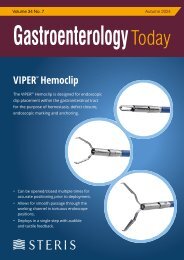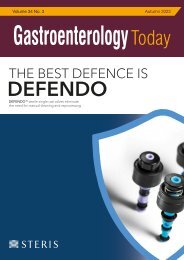Gastroenterology Today Winter 2022
Gastroenterology Today Winter 2022
Gastroenterology Today Winter 2022
Create successful ePaper yourself
Turn your PDF publications into a flip-book with our unique Google optimized e-Paper software.
ADVERTORIAL FEATURE<br />
WORKING TOWARDS QUALITY<br />
STANDARDISATION FOR FAECAL<br />
IMMUNOCHEMICAL TESTING<br />
Alpha Laboratories recently held a FIT user group meeting that<br />
was attended by some of the leading laboratories who utilise<br />
the HM-JACKarc technology for their faecal immunochemical<br />
testing service. Key speakers discussed their challenges and<br />
contributions towards standardisation and quality in FIT testing.<br />
So far, work has been completed to establish the current status of four<br />
automated FIT systems (5): HM-JACKarc (Minaris Medical Co. Ltd,<br />
Japan): OC-Sensor PLEDIA (Eiken Chemical Co. Ltd, Japan); SENTiFIT<br />
270 (Sentinel Diagnostics, Italy), NS-Prime (Alfresa Pharma, Japan);<br />
data show that all analysers met manufacturers’ claims.<br />
GASTROENTEROLOGY TODAY - WINTER <strong>2022</strong><br />
6<br />
FIT Quality Assurance<br />
Carolyn Piggott, FIBMS, Research Scientist, Bowel Cancer Screening<br />
Programme (BCSP), Southern Hub, Guildford<br />
Carolyn Piggott presented on the factors that contribute towards the<br />
pre-analytical and laboratory challenges faced in FIT testing. The major<br />
contributors are the differences in faecal samples, inconsistent sampling<br />
by participants and haemoglobin (Hb) stability in faeces. In addition<br />
to sample variability, there is no FIT assay standardisation. Different<br />
reagents are used between each manufacturer and there is no primary<br />
reference materials of methodologies. The lack of standardisation or<br />
harmonisation of FIT means that variations are observed in f-Hb results<br />
generated on different systems.<br />
Carolyn mentioned a range of approaches to tackle these challenges.<br />
One development is that manufacturers have developed new buffers<br />
focused on improved sample stability. Also projects are being<br />
undertaken at BCSP Guildford, which include evaluation of the available<br />
EQA (1), third party internal QC (2) and the effect of Hb-variants (3). In<br />
addition, they are working in conjunction with the IFCC FIT Working<br />
group, established in 2017, to formally address the challenges<br />
(representatives from other manufacturers, clinical scientists, and<br />
representatives from EQA companies) according to the references<br />
below(4):<br />
Terms of Reference<br />
• To attempt to standardise analysis of haemoglobin in faecal samples<br />
by immunochemistry (FIT)<br />
• To identify all sources of pre-analytical variation and standardise if<br />
possible<br />
• To establish external quality assurance and third-party internal quality<br />
control programmes<br />
• To determine impact of assay interference of Hb variants and other<br />
factors<br />
Additionally, EQA programmes investigated types and imprecision of<br />
EQAS available worldwide. 13 manufacturers of EQA were identified<br />
and 11 agreed to take part, to either provide: faecal-like material<br />
loaded by participants (UK NEQAS and HECTEF, Japan), faecal-like<br />
material loaded by EQA provider (WEQAS and CEQAL, Canada), or<br />
aqueous material loaded directly onto the analysers in cups (CRB,<br />
Italy, ESFEQA, Germany, Labquality, Finland, SEKK, Czech Republic,<br />
SEQC, Spain, SKML, Netherlands). Results showed that faecal-like<br />
matrices have larger coefficient of variant (CVs), and liquid materials<br />
have smaller CVs.<br />
Carolyn also reported on the evaluation of QC material from each FIT<br />
manufacturer, measured on the other three analysers, and the CVs<br />
were overall

















